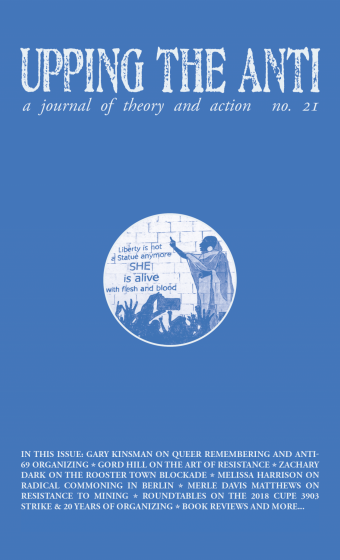Introduction

As we close this decade, the need for emancipatory knowledge production in tandem with uprisal, refusal, and resistance is ever more apparent. Yours truly, the editorial committee of Upping the Anti: A Journal of Theory and Action, have been working diligently to highlight pressing debates and marginal voices on the radical Left that have been occupying the minds and hearts of organizers and activists in Turtle Island and beyond. As an independent and volunteer-run print and online publication, we rely on your contributions and readership in the difficult economic struggle of survival. This project is not only important to showcase the writings by and for activists, but also to serve as an arena to theorize new ideas on struggle and solidarity, movements and momentum, future and freedom. As we produce these articles, interviews, roundtables, and book reviews, we ask ourselves how will they help foment praxis and liberation? The task of producing knowledge that revolts against the tyranny of ideas and ideologies is no small feat.
In this past year alone, we have seen the unsettling face of fascism: hate rallies, the People’s Party of Canada, and Doug Ford creeping into the mainstream political sphere as the federal election promises more of the same. The city in which our journal is based, Toronto, has seen funding cuts from education, safe injection sites, and basic income programs to name a few. Though neoliberalism continues to find new footholds in this country and abroad, organizers and activists the world over continue to fight back. This year marks the 20th anniversary of the World Trade Organization (WTO) protests in Seattle. The year 1999 marked a shift in focus onto the power of multinational corporations and the pitfalls of globalization. Twenty years later, we see millions of people marching in Climate Strikes demanding an end to the destructive legacy of environmental collapse. The Grassy Narrows contingent in the Toronto march drove home the message that there can be no climate justice without Indigenous justice.
This year also marks the 100th year anniversary of the Winnipeg General Strike. As the topic of our editorial, researching and debating the Winnipeg General Strike helped us further understand the importance of the general strike as a weapon of the working class in this day as much as it was 100 years ago. Last spring, our comrade Sara Swerdlyk (Central European University) facilitated a UTA reading group focused on Rosa Luxemburg’s The Mass Strike, helping us and our participants analyze her seminal work and debate its application in the present day. General strikes and mass protests lie at the crux of our liberatory movements, but what is the bedrock of fostering a culture of political participation that doesn’t entail casting a dead end vote? We can look to inspiration from the close to one million rallying and striking Pueto Ricans who demanded the ousting of Governor Rossello or the scores of Venezuelans who took to the streets to protest US imperialism and uphold democracy. Our cover art this issue depicts queer and feminist revolutionary graffiti from the Middle East and North Africa, including Kandaka, the symbol of the Sudanese anti-government revolt that has proven how the power of the people can topple long standing rulers. Palestinians continue to march for the right of return as Israel’s endemic apartheid state attempts to crush the spirit of resistance and Kashmiris around the world are protesting the brazen annexation and siege of their lands by the Indian state. The people of Unist’ot’en continue to resist settler colonial encroachment and violence, part of a 500-year legacy of Indigenous resistance to land theft and state-sanctioned murder. Connecting the dots between anti-colonial struggles to queer liberation, from radical unionism to resisting austerity, Upping the Anti always strives to bring you, our reader, more insight into past and present murmurs, sparks, and explosions of resistance by showcasing the writing of brilliant thinkers and organizers on the radical Left.
Our issue starts off with letters to the editor, followed by our editorial on the 1919 Winnipeg General Strike in which we offer an overview of the history of the strike, its implications stretching the last 100 years, and our take on the impetus of the mass strike and popular movements.
In our interviews section, Devin Clancy speaks with Gord Hill about his work as a comics creator and movement organizer. We last interviewed Hill in 2009 for Issue 5 on the eve of his involvement with the anti-Olympics campaign in Vancouver. In this interview, Hill speaks about his beginnings as an anarchist punk zine creator and the shifting nature of movement art. Gord Hill also shares his thoughts on our contemporary moment and the necessity of anti-fascist organizing in the shadow of climate catastrophe. Next, Ryan Conrad interviews long-time queer liberation and anti-capitalist activist Gary Kinsman about his work to challenge the Liberal government’s pink-washing campaign celebrating the 1969 Criminal Code reform that decriminalized homosexuality. As a member of the Anti-69 organizing committee, Kinsman explains that the Liberal celebration of 1969 obscures how limited the criminal reforms actually were and squarely criticizes mainstream inaction on issues of police violence against queer and racialized communities.
Our articles section is notably grounded, with a focus on the landscapes of organizing and resistance against capitalist speculation. First, Zachary Dark reflects upon the Rooster Town Blockade, a two-month long land occupation in Winnipeg, Manitoba, against the destruction of the Parker Wetlands by Gem Equities. Dark argues that the blockade brought together environmentalists and Indigenous activists in productive alliance, and should be understood as a form of “insurgent” urban planning. Next, in “The Ground Beneath our Feet,” Melissa Harrison writes about Prinzessinnengarten, a 6,000 m2 urban garden project in Berlin. Harrison explores the transformative potential of political gardening projects as a way of reclaiming our rights to the city through the practice of commoning. Commoning, Harrison argues, can be a powerful form of resistance to gentrification while simultaneously reanimating the grounds upon which our movements grow. Finally, in “Mining Makes this World Possible,” Merle Davis Matthews reflects upon the work of the Mining Injustice Solidarity Network, a Toronto-based group challenging the Canadian mining industry. By centering Indigenous resistance to mining, Davis mounts an explicitly anti-capitalist and anti-colonial critique in the hopes of building toward another world—one in which the land is not understood as an exploitable resource, but as a relationship of solidarity and accountability.
We begin our roundtables section with a reflection on the 2018 CUPE 3903 strike against York University. Devin Clancy speaks with union organizers Karl Gardner, Chelsea Bauer, Susannah Mulvale, and undergraduate student organizer Karmah Dudin about the corporatization of post-secondary education, and the need for teachers and students to organize together to challenge the gutting of our public education system. The participants reflect upon lessons learned in organizing, and what forms of organizing exerted pressure on York and its Board of Governors, while also speaking to the aftermath of the strike and our current moment. In “Twenty Years of Organizing,” Sharmeen Khan, along with Cindy Milstein and Aaron Lakoff, reflects on anti-capitalist organizing emergence of the anti-globalization movement in the late 1990s. Transcribed and edited from a panel discussion at the 20th Anniversary of the Montréal Anarchist Bookfair, the three revolutionaries reflect on changes in radical movements as we move from “Another World is Possible to the Possible End of the World.”
Last, but not least, we have three excellent book reviews. In “Rupturing Settler Myths,” Alie Hermanutz reviews Andrew Crosby and Jeffrey Monaghan’s Policing Indigenous Movements, which shines light on the dominant myths of the Canadian security apparatus about the supposed security risk that Indigenous nations represent. Next, Scott Price reviews Owen Toews’ Stolen City, which he describes as necessary reading for activists organizing at the nexus of gentrification and settler colonialism. Finally, Amelia Spedaliere reviews Occult Features of Anarchism: With Attention to the Conspiracy of Kings and the Conspiracy of Peoples by Erica Lagalisse. This book sparks debate around the intersections of spirituality and activism by drawing the historical connections between early Renaissance spiritual sects and societies and the development of radical movements, with a focus on anarchism.
The pieces above would not have come to fruition were it not for our invaluable advisory board, associate editors, transcribers, and proof-reading volunteers. Thank you again for catching most of our typos: Rocio Velasquez Guzman, Sara Swerdlyk, Amelia Spedaliere, Irina Ceric, Anita Castelino, Tyler Chartrand, and Annelies Cooper. We would like to welcome Nisha Toomey to our advisory board and Kieran Hart back to our editorial collective. A whopping thank you goes to all our subscibers and sustainers! You are the lifeblood of this project. Thank you to Geordie Dent for bringing us snacks and water as we took over his apartment.
The editorial committee of Upping the Anti continues to struggle to maintain our commitment to releasing two issues a year. If any of our readers would like to provide support with editorial content, publishing, or fundraising, we would of course be always grateful. With our comrades at Shameless Magazine losing their Ontario Arts grant and Canadian Dimension ceasing its print edition of the magazine, we are met with increasing barriers to maintaining Upping the Anti.
While you’re ruminating on all the illuminating topics and perspectives in this issue, please keep in mind your important role, beloved reader. If you would like to distribute Upping the Anti in your community or know a rad bookstore that doesn’t carry our journal, please email us at uppingtheantidistro@gmail.com to let us know. We continue to send free journals to our incarcerated comrades in US prisons and broaden our reach online and in print. Due to limited funds and stretched production costs, we have been unable to pay our contributing writers. As an ongoing struggle to make ends meet, we ask you to subscribe to our journal and become a sustainer to help us build a writer’s fund to make this project more sustainable. Got a rich auntie, an empathetic professor, or a union looking to support grassroots radical media? Ask them too! Donations can be made at uppingtheanti.org/donate.
If you’re broke and everyone around you is too (because shit is real in this economy), you can plug into UTA in other ways. Send us a pitch for an article, book review, interview, or roundtable at uppingtheanti@gmail.com. Write us a letter about something you found interesting or troubling from Issue 21. Follow us on Facebook, Twitter, and Instagram, and tell your friends. Send us an email if you’d like to join the editorial collective or advisory board, or would like to help out in any capacity. Check out our website uppingtheanti.org for more information on submission guidelines, how to join, how to promote our journal, and to stay alerted to events.
We hope you enjoy this issue!
In struggle and solidarity,
Brett Caraway, Devin Clancy, Jasmine, Karl Gardner,
Kieran Hart, Mariful Alam, Niloofar Golkar, Sharmeen Khan, and T. Vega

